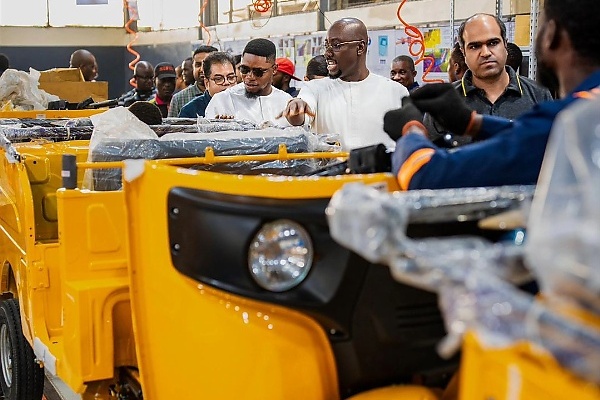Obi Cubana, a well-known Nigerian socialite and businessman, has opened a tricycle production facility in Lagos. Cubana is making a significant foray into the transport industry with this. The facility is owned by Enviable, a company with its main office located in Abia, and is located in the Ikorodu neighbourhood of Lagos.
The official opening of the assembly plant, which shows Obi Cubana’s foray into the automotive industry, has left the business community in turmoil. The millionaire, who was previously well-known for his prosperous ventures in the hotel, real estate, and entertainment sectors, is now focusing his efforts on offering Lagos residents access to reasonably priced and effective transport options.
Read also: WIOCC secures $50 million for Africa’s digital gap
Fuel-efficient tricycles designed for intercity travel
The low fuel consumption of the tricycles produced at the Enviable assembly plant is one of their most notable features. These tricycles are an inexpensive transportation option for commuters who want to cut back on their gas consumption because they can journey from Lagos to Osun and back to Ilorin on a single gallon of petrol.
The tricycles’ fuel-efficient design is an obvious example of the company’s commitment to environmental responsibility and innovation. The reduced fuel consumption of tricycles results in lower carbon dioxide emissions, which is advantageous for both the environment and the riders.
Obi Cubana’s positive impact on the Lagos transportation sector
The Lagos transportation sector is expected to benefit from the establishment of the tricycle manufacturing plant. By offering a dependable and reasonably priced substitute for more traditional forms of transportation, the tricycles would help reduce gridlock on Lagos’ streets and encourage general mobility among the city’s inhabitants.
Read also: 3MTT partners with AltMall to provide laptops for their fellows
The assembly facility would create employment opportunities for the residents of the Ikorodu area, therefore strengthening their local economy. The growing output of the facility increases the likelihood of attracting new enterprises and investments, therefore supporting the local economy even more.
Obi Cubana’s bold and clever foray into the trike assembly industry reflects his agility and love of business. By building an efficient fuel-consuming tricycle assembly facility in Lagos, he is positioning himself to profit from the growing need for fairly priced and effective transportation choices in the city.
With the assembly plant in place, Lagos’s transport infrastructure should be improved, employment opportunities in the nearby area should be improved, and city mobility should be increased. As Obi Cubana develops his commercial activities, it would be fascinating to see how his entry into the automotive industry affects mobility in Lagos and beyond. This might be a somewhat amazing turn of events.




